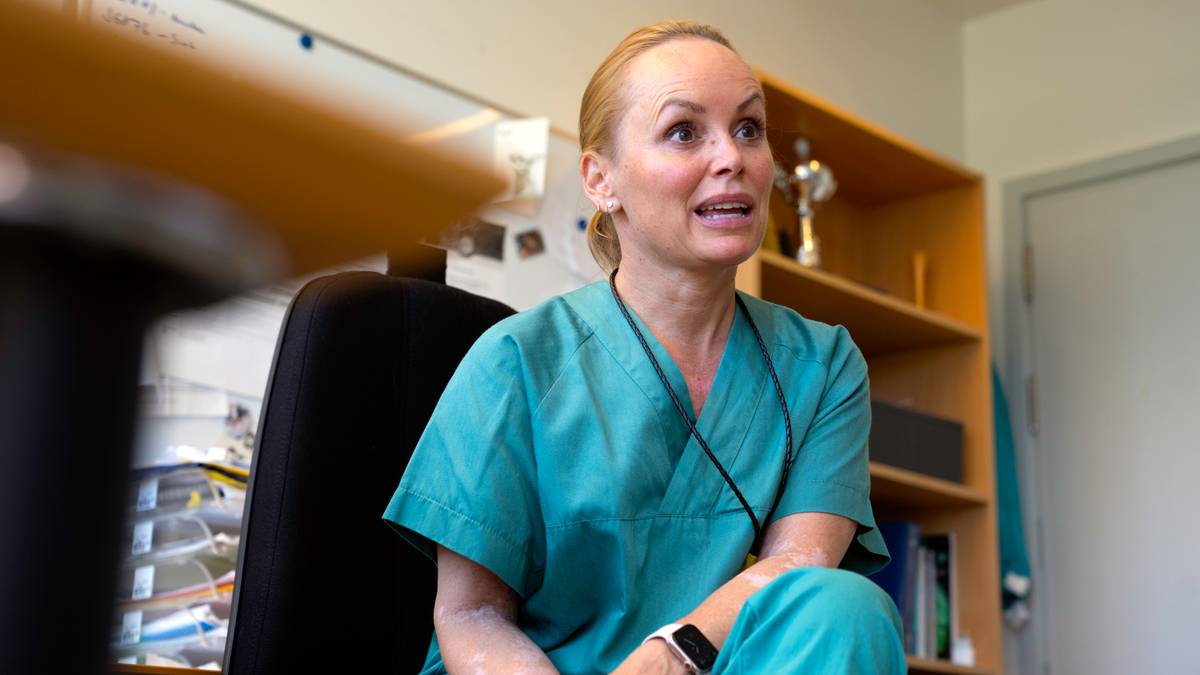In 2021, the then Minister of Health and Care Services Bent Høie apologized to all Norwegian patients with endometriosis and adenomyosis.
At the same time as he started a prestigious project on women’s health, he decided that a committee should review the treatment of patients with these diagnoses.
Today, the committee expresses great dissatisfaction with the recommendations sent by the Norwegian Directorate of Health to the Ministry of Health and Care Services.
Guri Majak says the Norwegian Directorate of Health has too much changed the wording of the document they forward to the Ministry of Health and Care Services.
Photo: Kristin Granbo / NRK
– In agreement, we have arrived at the main points we believe are a minimum to improve the offer for patients. What we now see is not in line with what we have been working on.
This is what the leader of the Endometriosis Association, Elisabeth Larby, tells NRK.
Guri Majak, chief physician at the gynecology department at Ullevål, has contributed to the committee.
When they sent their proposals to the Norwegian Directorate of Health, they were clear and concise in their proposals, says Majak.
– What is forwarded to the Ministry of Health and Care Services unfortunately looks somewhat different, she believes.
At the bottom of the case, you can read a comment from the Ministry of Health and Care Services and the Norwegian Directorate of Health.
– We were crystal clear
The committee, which consists of, among others, user organizations, doctors and health trusts, has been working with the councils since November last year.
Guri Majak says the committee in its proposal especially emphasized three things:
- Create a national competence service
- Create national guidelines
- Establishment of endometriosis teams in all health regions, as well as centralization of advanced surgery
Majak believes that these changes would lead to patients being caught earlier, that they would receive better and more effective treatment.
The Norwegian Directorate of Health included these advices in its letter, which they send to the ministry.
– But in their summary, they have changed the wording significantly. The selection was far clearer in what we wanted, says Majak.
– What I am most afraid of is that the responsibility for change will be pulverized, she says, and hints that this is what has happened now.
Fear zero change
She believes that an assignment from the Ministry of Health and Care Services is what is needed to create structural changes.
In its document, the Norwegian Directorate of Health writes the following:
Majak fears it is not clear enough to change anything.
– I am afraid that the responsibility is shifted down to a level where there are no resources to take in things.
– At the same time, I am afraid of expressing too much dissatisfaction. I think there are many who have had great openings to this work, she says.
She also helps the Minister of Health and the Ministry understand the importance of the work the committee has done, and why this is important for patients.
Elisabeth Larby, chairwoman of the Endometriosis Association, confirms what Majak says.
– There have been many expectations associated with this document. But with so many recommendations from the Norwegian Directorate of Health, I think there is a very disappointed patient group left, says Larby.
– Vague recommendations
Larby believes it must be harder to shoot, than as it is now formulated in the letter from the Norwegian Directorate of Health.
– But we have already made this assessment. It feels like the work we have done is undermining, says the chairman of the board.

Elisabeth Larby, chair of the board of the Endometriosis Association, believes that tougher action is needed to bring about real change.
Photo: The Endometriosis Association
Larby says the committee had hoped for several things when they submitted their advice to the Norwegian Directorate of Health.
– But something we had really hoped for was that the treatment offer would be better and prioritized harder. Then concrete measures are needed, and then it does not hold with recommendations like this, she says.
Larby describes a feeling of standing on the spot resting.
– This will not lead to real improvement – for a patient group that really needs it.
Answer from the ministry
When asked what the Ministry of Health and Care Services will do with the recommendations they receive from the Norwegian Directorate of Health, this is answered in an e-mail:
– The Ministry of Health and Care Services has just received the report from the Norwegian Directorate of Health, and will review and assess how the proposals should be processed. The Ministry has registered the input from the members of the working group is referred to in the appendix to the report.
The Norwegian Directorate of Health defends changes that have been made.
– The Norwegian Directorate of Health has, as informed from the start of the work, responsibility and final decision-making authority for the content of the report which has been sent to the Ministry of Health and Care Services. Written input from the working group is included unchanged with the report as an appendix, writes department director Torunn Janbu.
– It may seem as if the Norwegian Directorate of Health does not want to use the resources required to implement what Majak describes as “real change”. What do you say to that?
– The Norwegian Directorate of Health has clear recommendations which we believe will improve the situation and lead to real changes. When it comes to internal prioritization in the Norwegian Directorate of Health, the resource situation is demanding after the pandemic, which can be affected by the start of important work, Janbu answers.
She writes at The Norwegian Directorate of Health agrees that there are challenges associated with handling the patient group, and that she would like to thank the working group for the work.

